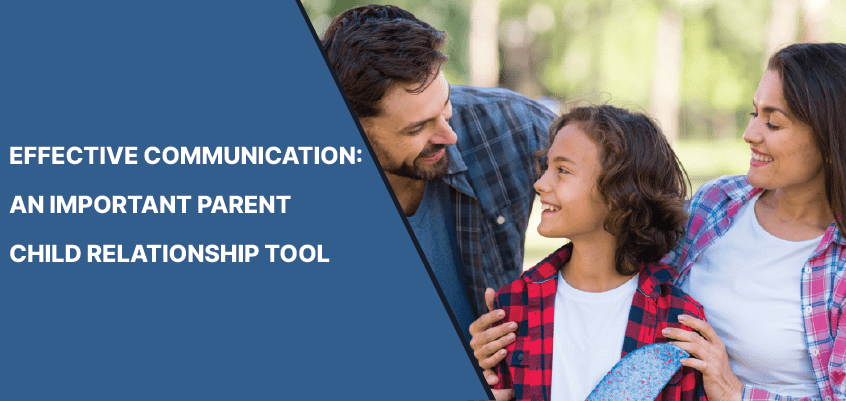INTRODUCTION
Good communication between parents and children is necessary. It develops a healthy relationship among them. The question is, what is effective communication? Sometimes you communicate to understand your child’s feelings, needs & wants. This kind of communication will enhance your relationship with your child. Effective communication is constructive in some way for your kids.
- It will give courage to your child to trust you.
- Helping to express your child’s emotions & feelings
- Helping to convey complex topics as they grow older.
On the other hand, you will see a lot of misunderstandings and arguments in your relationship with your child if there is a need for more communication.

Benefits of Effective Communication for Children
Let’s discuss the multiple benefits that effective communication provides for your child’s overall growth[1]:
- Fostering trust: If you want to care parent-child relationship, you must build good communication. It helps in a positive parent-child relationship and promotes trust in relationships outside the home.
- Encourage openness: Your child’s confidence will improve this way, and let them open up and share difficult conversations with you.
- Social skills: When your child knows how to express themselves, it helps them to improve and develop social skills. Effective communication lets express their feelings and thoughts.
- Self-expression: Sometimes, your child feels heard and understood. They are more likely to feel confident communicating with others. Regular communication with you helps your child in self-expression.
The key to effective communication is consistency. You have to give importance to regular effective communication with your child. It will also help build a solid foundation for their growth and success.
Barriers to Effective Communication
Although you face some barriers that can affect effective communication with your child[1][2]. Let us discuss them:
- Conflicting schedules: You and your children may have different schedules due to your other responsibilities and duties. For this reason, you don’t have enough time to spend with your child. It could affect your parent-child communication.
- Impact of technology: Today’s life has a heavy influence on technology. Introducing new gadgets, games, and online videos is very addictive. Your child may spend much of their time in front of screens. It creates a communication barrier between you and your child. To prevent this situation, you must develop some rules around device usage so that you and your child find some quality time together.
- Skills and techniques: You may need help communicating effectively with your child due to inadequate skills. It leads to misunderstanding and also gives rise to conflicts between you and your child. To negotiate this situation, you must learn new skills and techniques to improve your communication skills with your child.
Several barriers can hinder effective communication. It hampers your parent-child relationship. You need to identify those barriers. It is the first step in overcoming them. You can build stronger, healthier relationships with your child by creating time for communication, reducing technology distractions, and learning effective communication strategies.
Tips for Enhancing Communication with Children
There are some helpful tips for enhancing communication with your children[1][2]:

- Active listening: Show interest and try to listen to your child during the conversation with your child. It will surely help your child feel more valued and respected and allows you to understand them better.
- Open-ended questions: Replacing the simple “yes” or “no” questions with some open-ended questions. It would give your child a scope to explain the situation in detail, which will be a more meaningful conversation.
- Offering praise and encouragement: Give your child positive feedback. It will motivate them to share their feelings and communicate well with you. Encouragement and offering praise will reinforce the positive behaviors in your child.
Mistakes to Avoid in Effective Communication
You must avoid some mistakes in communication that can potentially hurt the parent-child relationship[1]:

- Criticism: Sometimes, talking to our child, we may disagree with something. But it’s wise not to use criticism to show our disagreement because it can discourage and demotivate our child and potentially affect communication.
- Yelling: Screaming at our children can make them anxious and scared and affect communication.
- Dismissive Language: It’s better not to use statements such as “I don’t want to hear it” or “It’s not a big deal,” as this can affect communication. We have to avoid it.
We must use positive language. We should offer constructive feedback and listen to our child actively. Because all these habits can promote a healthy and positive parent-child relationship and help develop trust and respect between us.
Overcoming Challenges in Parent-Child Effective Communication
If you understand and communicate with your child better, learn about child development stages and different developmental needs at each stage. The awareness will help you speak in age-appropriate language to facilitate effective communication. Read This Article 5 Tips to have open communication with your parent .
Adapting communication styles to different developmental stages: Depending on your child’s age, a few communication tips would be highly effective. If you have a young kid, to communicate with them, use simple language, shorter sentences, and more visual aids. If you have a teenager, you should occasionally have more discussion base communication and detailed conversations. You can consult a specialist to understand age-appropriate communication according to your child’s developmental stage[1][2].
Sensitive topics: Whenever you talk with your child, you positively address disagreements and sensitive topics. Talking about sensitive topics may cause tension and misunderstanding between you and your child. You need to approach difficult parent-child conversations with empathy and respect. Listening actively and trying to understand the child’s perspective is crucial. You should avoid using critical or dismissive language and instead use “I” statements to express your feelings without attacking the child.
CONCLUSION
A strong relationship with your child requires good parent-child communication. Good communication will help you build trust between you and your child and promotes your child’s emotional and social development. Some common mistakes and barriers affecting communication between you and your child can be busy schedules, too much abuse of screens, and a lack of proper communication skills. Learning adequate communication skills and techniques to cater to your child’s needs can help you establish good communication.
To develop a better parent-child relationship. You can connect to our expert counselors or explore more content at United We Care! United We Care’s team of wellness and mental health experts will guide you toward well-being.
References
[1] Center for Effective Parenting, https://parenting-ed.org/wp-content/themes/parenting-ed/files/handouts/communication-parent-to-child.pdf (accessed May 16, 2023).
[2] Indiana Parenting Time Guidelines, https://www.in.gov/courts/rules/parenting/parenting.pdf (accessed May 16, 2023).











